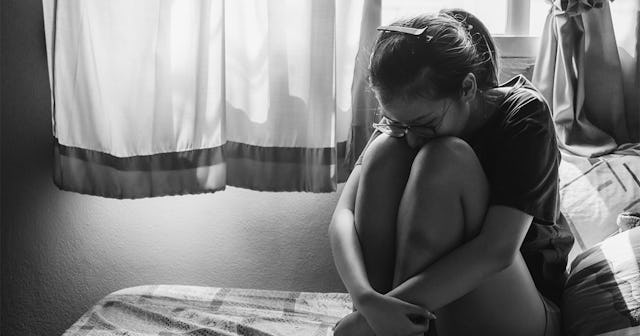There Are Numerous Reasons Why Abuse Victims Stay — And Don't Always Ask For Help

The first time he hit me, I didn’t know what to make of it. He was drunk — very drunk — and we were tussling in the kitchen. Arguing over meals, money, and a smashed banana. Yes, really, a piece of fruit precipitated the first blow. The first strike. The first “crime.” But if I’m being honest, the details don’t matter, not really. What matters is that, in an instant, I became “that woman,” i.e. I became a broken woman. A beaten woman. A battered woman. I became a woman lying about the cause of her (near) broken nose and black eye. And while I would like to say that this incident was isolated — while I would love to tell you I got up and walked away — I didn’t. I stayed in an abusive relationship for 10 years, and then six more.
My abuser and I still live under the same roof.
Now I know what you’re thinking. But why? Get up. Get out. Walk away. And you’re right: I should, even though it’s been six years since our last incident. I haven’t been hit, slapped, kicked, pushed, punched, or choked in 2,190 days. But I stayed. Like millions of others, I stayed, and the reason I’m still here is complicated and complex.
“Abusive relationships are extremely complex situations and it takes a lot of courage to leave,” the National Domestic Violence Hotline says. “Abuse is about power and control. When a survivor leaves their abusive relationship, they threaten the power and control their partner has established over the survivor’s agency, which may cause the partner to retaliate in harmful ways. As a result, leaving is often the most dangerous period of time for survivors of abuse.” It’s also scary as hell. Codependency and a lack of autonomy are common amongst abuse victims. Getting up and getting out is hard fucking work.
But that’s not all: Women (and men) stay in abusive relationships for dozens of reasons. “[I stayed because] I was shit scared of him,” one Twitter user writes. She figured “I’d die trying [to leave] or I’d loose (sic) the kids and take my own life.”
“[I stayed because] I had no money, a 3 month old baby and he controlled [the] money,” another explains. “I was scared my baby would go hungry #whyistayed #domesticabuse #coercivecontrol”
And another individual stayed because they felt isolated and alone. “I thought I had no friends and nobody would help or support me if I left.”
Of course, I stayed for all of these reasons and more. My husband was sick. Very sick. He was an alcoholic, and he only struck me when he was intoxicated. It was a symptom of his illness, if you will. These were booze-fueled beatings. It was alcohol-induced abuse, and as such, I found ways to dismiss and excuse his behavior. After all, our wedding vows reminded me we were to stay together “in sickness and in health, til death do us part.” I wouldn’t abandon a sick friend in their time of need, so why would I leave him? I couldn’t leave him.
I was afraid — of him and of me. My self-esteem was in shambles. I believed I couldn’t make it on my own, and I was ashamed. How pathetic was I? Hell, how pathetic am I? I stayed with someone who regularly punched me and pushed me. Who put me down. And who tried to drown me. Yes, my husband and abuser held my head underwater. I fought and flailed. Somehow I managed to get up. I also stayed because, strange as it sounds, I loved him. I met my husband in grade school. We were friends first, lovers second, and between beatings, I saw glimpses of the boy he was, not the man he became.
According to the National Domestic Violence Hotline, this is a common reaction. “Experiencing abuse and feeling genuine care for a partner who is causing harm are not mutually exclusive,” the National Domestic Violence Hotline explains. “Survivors often still have strong, intimate feelings for their abusive partner. They may have children together, want to maintain their family, or the person abusing them may simply be charming (especially at the beginning of a relationship) and the survivor may hope that their partner will return to being that person.” That was the case with my husband and me. I held out hope he would return to his normal, loving self. But when he sobered up — when the beatings stopped and bruises began to fade — the trauma remained. Mentally, I am still held captive.
But I’m working to break the trauma bond. I’m strengthening my soul and my resolve and I’m becoming not a victim but a survivor. Every day I am fighting to overcome and break free of the abuse.
If you or someone you know is in immediate danger, call 911. If you aren’t in immediate danger and/or you have an opportunity to reach out, do. Confide in a trusted friend, family member, therapist, and/or volunteer with an abuse shelter or call a domestic violence hotline.
This article was originally published on